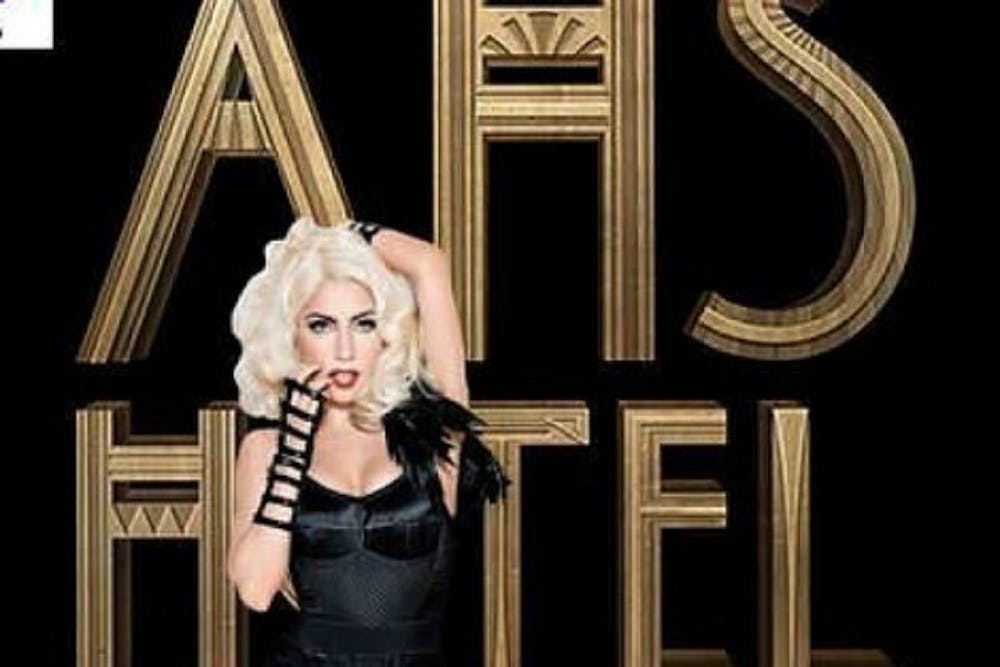Lady Gaga headlines fifth season
By Devon Shuman, Senior Staff Writer
The success of "American Horror Story" doesn't make sense on paper.
Horror, as a genre, simply isn't that popular. Truly remarkable horror films, such as "Crimson Peak" or "The Babadook" rarely do well at the box office.
Audiences for popular flicks like "Insidious" and "Paranormal Activity" are mainly composed of teens and 20-somethings who see scary movies as a social event, a rite of passage in which they turn the lights off, cuddle up together and scare themselves. It isn't the kind of audience that earns a show Emmy nominations.
People who stay away from the genre handpick from a variety of typical, accepted excuses: - "The storylines are always stupid," "They're so predictable," or, "Why would I want to watch something so grotesque and creepy?"
And, as far as grotesque and creepy go, "American Horror Story" takes the bloody, slimy, body-part-infused cake.
In "Hotel," the first episode alone bombards viewers with an onslaught of horrifying and disturbing images - a human body crawling out of a sewn-up mattress, a bloodthirsty couple slaughtering and feeding on another couple during an intimate foursome, a not-quite-human creature murdering a man by means of rape with a sword-like strap-on.
"Friday the 13th" feels like a Disney musical in comparison.
The latest season of the anthology series centers on the Hotel Cortez in Los Angeles, which offers much more than turn down service and a continental breakfast. James March (Evan Peters) built the hotel in the 1920s and designed it to accommodate his murderous desires.
Like the "Murder House" in the first season, the eerie corridors of the Cortez are inhabited by both current residents and the ghosts of past occupants. The expansive list of inhabitants includes Iris (Kathy Bates), the cold hotel manager, Hypodermic Sally (Sarah Paulson), a drug addict and John Lowe (Wes Bentley), a detective investigating a string of murders.
So, why does "American Horror Story" work? What makes the same people who abhor the genre for its cheap thrills and predictable storylines eagerly tune in every week?
In many ways, "AHS" is nothing like the movies that dominate the genre nowadays.
While the "Sinisters" and "Conjurings" of the world cash in on quick scares and special effects, "AHS" puts its focus on well-developed, complex characters and storylines. It uses horror not simply for horror's sake, but rather as a vehicle to expose and explore the terrifying capabilities of the human race.
Showrunners Ryan Murphy and Brad Falchuk are masters at creating characters. They fill each season with characters so deep and intricate we find ourselves sympathizing with even the most horrid individuals. These are the guys who, in "Coven," made us periodically feel bad for a racist woman who caged and tortured black slaves in her attic.
And, in a series that continually features Emmy-nominated actors such as Jessica Lange, Denis O'Hare and Angela Bassett, the most interesting character in "Hotel" so far is played by a newcomer - the ever-eccentric Lady Gaga.
Gaga plays "the Countess," a rich and seductive fashionista who uses her sexuality to lure victims and satisfy her thirst for blood. As anyone who is even slightly attuned to pop culture can attest, Lady Gaga is a strange individual - she's bizarre, pushes boundaries and, at times, is quite disturbing - which is why she fits perfectly into the "AHS" universe.
Fans of "Game of Thrones" complain about its 10-episode seasons, arguing that the story is so large and complex that it could benefit from an additional three episodes. The issue with "AHS" is completely opposite. Each season is constructed masterfully, slowly building tension and weaving together marvelous storylines. But then, around episode eight or nine, it falters.
When it should be reaching a climax, it instead starts introducing new characters and subplots in order to fill the last few episodes. It becomes too complicated and hard to follow and, worst of all, detracts from the brilliance of the rest of the season.
It's too early to tell if "Hotel" will follow suit, but if Murphy and Falchuk want to turn a great show into a spectacular one, it's something they will need to address.
For now, though, we don't have to worry about end-of-season mishaps. For the next few weeks, all we need to do is check in and enjoy our stay.
4/5 stars

